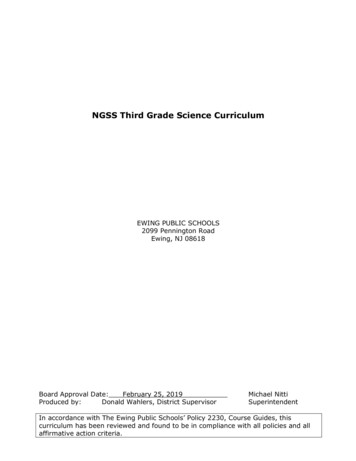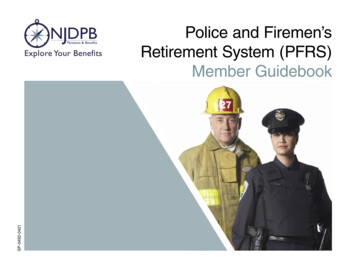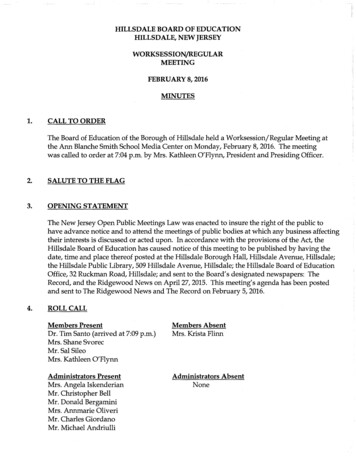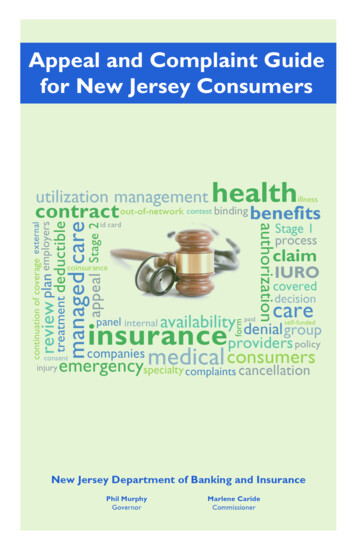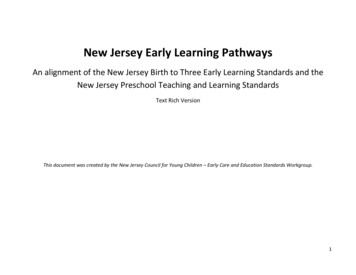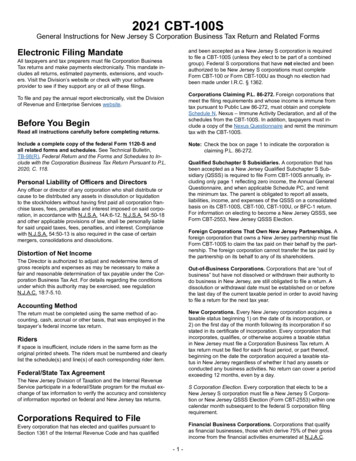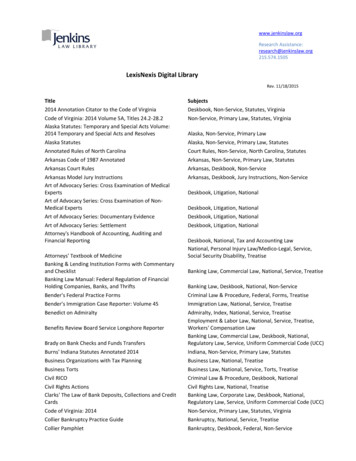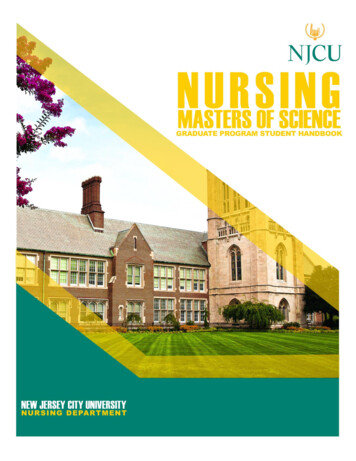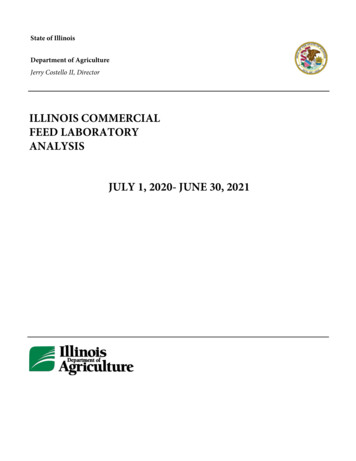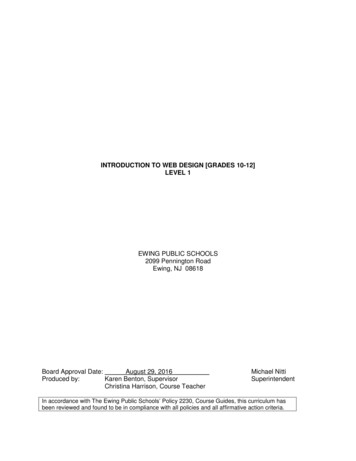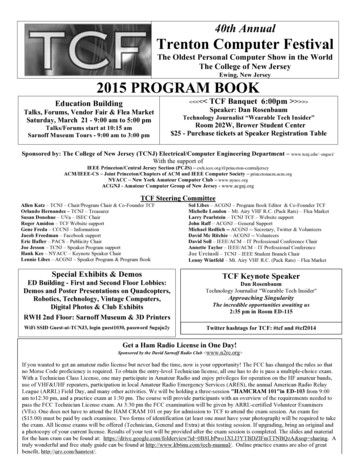
Transcription
40th AnnualTrenton Computer FestivalThe Oldest Personal Computer Show in the WorldThe College of New JerseyEwing, New Jersey2015 PROGRAM BOOK Education BuildingTalks, Forums, Vendor Fair & Flea MarketSaturday, March 21 - 9:00 am to 5:00 pmTalks/Forums start at 10:15 amSarnoff Museum Tours - 9:00 am to 3:00 pmTCF Banquet 6:00pm Speaker: Dan RosenbaumTechnology Journalist “Wearable Tech Insider”Room 202W, Brower Student Center 25 - Purchase tickets at Speaker Registration TableSponsored by: The College of New Jersey (TCNJ) Electrical/Computer Engineering Department – www.tcnj.edu/ engsci/With the support ofIEEE Princeton/Central Jersey Section (PCJS) – ewh.ieee.org/rl/princeton-centraljerseyACM/IEEE-CS – Joint Princeton/Chapters of ACM and IEEE Computer Society – princetonacm.acm.orgNYACC – New York Amateur Computer Club – www.nyacc.orgACGNJ - Amateur Computer Group of New Jersey - www.acgnj.orgTCF Steering CommitteeAllen Katz – TCNJ – Chair/Program Chair & Co-Founder TCFOrlando Hernandez – TCNJ – TreasurerSusan Donohue – UVa – ISEC ChairRoger Amidon – TCF Website supportGene Freda – CCCNJ – InformationJacob Freedman – Facebook supportEric Hafler – PACS – Publicity ChairJoe Jesson – TCNJ – Speaker Program supportHank Kee – NYACC – Keynote Speaker ChairLennie Libes – ACGNJ – Speaker Program & Program BookSpecial Exhibits & DemosSol Libes – ACGNJ – Program Book Editor & Co-Founder TCFMichelle London – Mt. Airy VHF R.C. (Pack Rats) – Flea MarketLarry Pearlstein – TCNJ TCF – Website supportJohn Raff – ACGNJ – General SupportMichael Redlich -- ACGNJ -- Secretary, Twitter & VolunteersDavid Mc Ritchie – ACGNJ -- VolunteersDavid Soll – IEEE/ACM – IT Professional Conference ChairAnnette Taylor – IEEE/ACM – IT Professional ConferenceJoe Urciuoli – TCNJ – IEEE Student Branch ChairLenny Wintfeld – Mt. Airy VHF R.C. (Pack Rats) – Flea MarketTCF Keynote SpeakerED Building - First and Second Floor Lobbies:Demos and Poster Presentations on Quadcopters,Robotics, Technology, Vintage Computers,Digital Photos & Club ExhibitsRWH 2nd Floor: Sarnoff Museum & 3D PrintersDan RosenbaumTechnology Journalist "Wearable Tech Insider"WiFi SSID Guest-at-TCNJ3, login guest1030, password 5ugaju2yTwitter hashtags for TCF: #tcf and #tcf2014Approaching SingularityThe incredible opportunities awaiting us2:35 pm in Room ED-115Get a Ham Radio License in One Day!Sponsored by the David Sarnoff Radio Club www.n2re.org If you wanted to get an amateur radio license but never had the time, now is your opportunity! The FCC has changed the rules so thatno Morse Code proficiency is required. To obtain the entry-level Technician license, all one has to do is pass a multiple-choice exam.With a Technician Class License, one may participate in Amateur Radio and enjoy privileges for operation on the HF amateur bands,use of VHF&UHF repeaters, participation in local Amateur Radio Emergency Services (ARES), the annual American Radio RelayLeague (ARRL) Field Day, and many other activities. We will be holding a three-session "HAMCRAM 101"in ED-103 from 9:00am to12:30 pm, and a practice exam at 1:30 pm. The course will provide participants with an overview of the requirements needed topass the FCC Technician License exam. At 3:30 pm the FCC examination will be given by ARRL-certified Volunteer Examiners(VEs). One does not have to attend the HAM CRAM 101 or pay for admission to TCF to attend the exam session. An exam fee( 15.00) must be paid by each examinee. Two forms of identification (at least one must have your photograph) will be required to takethe exam. All license exams will be offered (Technician, General and Extra) at this testing session. If upgrading, bring an original anda photocopy of your current license. Results of your test will be provided after the exam session is completed. The slides and materialfor the ham cram can be found at: https://drive.google.com/folderview?id 0B8LbPwo1XLI3YTBDZlFmTTNBQzA&usp sharing. Atruly wonderful and free study guide can be found at http://www.kb6nu.com/tech-manual/. Online practice exams are also of great2benefit, http://qrz.com/hamtest/.
******* 10:15 am to 11:10 am ********ED-115: Bitcoin - Digital Currency for the Future or the Past?, DonLibes, NISTAbstract: Is crypto-currency the future? Or just another bubble waiting topop? Learn about Bitcoins - the implementation, the potential, and the risks.Bio: Don Libes is a computer scientist at the National Institute of Standards& Technology, where he does research on Smart Manufacturing. He haswritten three books: Exploring Expect, Obfuscated C and Other Mysteries,and Life with Unix.ED-211: Software Development Apprenticeships: Closing the Skills Gapby Investing in Potential, Kyle Thomas & Catherine JarosAbstract: Finding technology talent is one of the more difficult aspects ofgrowing a technology dept. Surveys suggest as much as 95% of hiringmanagers have difficulty filling open positions. In competitive markets,talented developers generally have multiple offers at any given time and it is a"seller's market" from their point of view. New developers can requiresignificant training in the tools and processes of the trade. Many leave schoolnever having used tools such as version control and haven’t written code thatneeds to not just give correct output but must also be maintainable. Whilethere is an apparent shortage of developers, there is no shortage of peopleexcited to learn the skills to start a new career in programming as evidencedby the growing popularity of development bootcamp type programs.In our presentation we introduce the apprenticeship model as a method offilling software development positions. Our program uses short talks andchallenging exercises, coupled with highly available mentors and actualproduction projects to train developers in the tools and processes our companyuses. After only a short time the apprentices were able to begin contributing toprojects and quality code that met our standards. The initial investment oftime from senior developers was recouped by the availability of inexpensive,but high quality development hours for program. We will discuss recruitment,curriculum design, implementation and results/future improvements.Bio: Kyle Thomas runs the software development department for BrightonCromwell and is co-founder of EggZack.com. His current work focuses on thedevelopment and implementation of processes and technologies that improvethe software development process. He graduated from the University ofDelaware in 2012 with degrees in physics and chemical engineering. Kyle hasdone research on distributed computing, computational pharmacokinetics androuting protocols. He has given talks and authored papers on computationalphysics, self-adaptive/self-organizing systems and swarm intelligence.Bio: Catherine Jaros is a Human Resources Generalist who solely runs therecently implemented Human Resources Department at Brighton Cromwell.She has years of diverse human resources and management experienceworking in the fields of healthcare, international and national staffing, retailand now the defense industry. Her areas of expertise include recruitment,onboarding, performance management, staff development, employment law,employee relations, compliance issues, unemployment and leaves of absence.She is a member of the National Society for Human Resources Management(SHRM) and is currently in pursuit of being certified as a Professional inHuman Resources (PHR). Catherine is fluent in Polish and graduated SetonHall in 2008 with a degree in English and minor in French, with a stronginitial focus on Diplomacy and International Relation studiesED-209: Embracing Naming Conventions and File Structures to ImproveDigital Organization, John LeMasney, ConsultantAbstract: Many complain of having trouble finding files or discoveringcontent that they clearly remember putting on the machine in front of them.This is a highly solvable problem when you apply naming conventions to filesand folders on your machine. People who attend this workshop will be able todetermine the best way to name files, structure directories, and find content ontheir computer's file system with the end result of saving time, avoidingfrustration and being more productive.Bio: John LeMasney is a speaker, technologist, designer, developer andindependent consultant working in New Jersey. He was the Manager ofEducational Technology Training and Outreach at Princeton University fromMarch 2011 to March 2013. He had worked from 1998-2011 at RiderUniversity as the Manager of Technology Training. He was recently awardeda Master of Arts in Organizational Leadership with honors from RiderUniversity and a Bachelor of Fine Arts in Sculpture with honors from theUniversity of the Arts in Philadelphia, PA. He is a designer, artist, writer,poet, technologist, consultant, open web advocate and open source evangelist.FH-403 (moved from ED-208): Workshop - Introduction to Programmingin the Cloud, Peter J. DePasquale, The College of New JerseyAbstract: Cloud computing is among the hottest buzzwords in technologytoday, and holds great promise for how products and services are offered tothe world via the Internet. This workshop will provide an introduction to theterminology associated with cloud computing, as well as provide a hands-onexperience with several of Amazon.com's offerings in the cloud space. Wewill also discuss other cloud computing vendors and their offerings. Learnhow you can start to leverage the cloud for your personal computing as well asfor corporate/professional computing needs. Attendees will utilize TCNJ labfacilities and need a working knowledge of UNIX, SSH, and Java. Laptopsare welcome in the lab, and if you are more comfortable working on yourmachine, please bring it along - (please pre-install an SSH client, Java, and theApache Ant build tool for Java before arriving)! This is a hands-onworkshop! Lab space is limited to 24 existing stations. We can add a fewmore folks with personal laptops.Bio: Peter DePasquale is an Associate Professor of Computer Science at TheCollege of New Jersey. He holds a Ph.D. and Masters in Computer Sciencefrom Virginia Tech and a Masters and Bachelors in Computer Science fromVillanova University. His areas of research interest include cloud computing,computer science education and web application development. His workoften explores the practical application of computer science principals in thecreation of tools to assist in the introductory programming sequence. He isthe author of two programming language reference guides and co-author oftwo introductory programming textbooks.ED-207: GPS Secrets, Cass Lewart, Freelance WriterAbstract: There is more to a GPS than a pleasant voice telling you to turnright on Cedar Street, and a color display of adjacent ramps and intersections.I will cover the following subjects in my talk: 1) Technical background andimplementation of current GPS systems; 2) How user location is derived fromprecise atomic clocks on satellites, and from an imprecise clock in your GPSreceiver; 3) Capturing and analyzing the data stream coming from the GPS,and sending commands directly to the GPS; 4) Secret key codes (jailbreaking) that allow changing base maps on the GPS, a practice frowned uponby GPS manufacturers; 5) How GPS enabled devices, including cell phones,impact on your privacy; 6) Using a GPS for Geocaching, a modern version oftreasure hunting; 7) Review of currently available GPS devices; and 8)Modification of the built-in GPS vocabulary.Bio: Cass Lewart is an electrical engineer, a long time hobbyist, and author ofseveral books on computer programming, modems and programmablecalculators. Cass also has written many electronic project articles. Every yearhe gives talks at the Trenton Computer Festival on GPS, HDTV, databaseprogramming and other subjects. Cass and his wife Ruth were joint recipientsof the 2005 Hobbyist of the Year award from the Amateur Computer Group ofNew Jersey (ACGNJ). They are former presidents of the BrookdaleComputer Users Group (BCUG). He is a graduate of the Swiss FederalInstitute of Technology and worked at Bell Labs and Unisys.ED-206: Getting Started With PCs, Pads and Tablets, Including theInternet and Digital Photography, Herman Hinitz, Hinitz PhotographyAbstract: This session is designed for the beginner, people who would liketo use a PCs/pads for word processing, electronic spreadsheets, graphics,Internet (browsers), databases, antivirus programs, firewall programs, digitalphotography, etc., but are unsure how or where to begin. Appropriateexamples would be used with MS Office, etc. (Also, see a digitalphotography display in the building lobby area for related information andexamples).Bio: Herman Hinitz has used diversified software and hardware in research,consulting, publications, and digital photography. Some of his work has beenincluded in commercially available books, professional publications, fine artcollections, and gift shops. He is a long time supporter of TCF.ED-113: Satellite Reception Made Easy with FTA, Mario Filippi, ARRLAbstract: Geostationary satellites orbiting the Clarke Belt located 22,600miles in space are a copious source of international information andentertainment for anyone interested in setting up their own Ku-band Free toAir Satellite system. For a minimal investment one can travel the world viasatellites such as Telstar-12, Hispasat, Galaxy-19, SES-2, Intelsat-14 andSatMex-6 using a 30 inch dish along with a High Definition set-top box.Using FTA satellite will allow one to receive free international television andradio broadcasts from distant lands such as Central/South America, theCaribbean, Middle East, Far East, and parts of Europe. Want to find out what'shappening in Israel, Cuba, the Vatican, Morocco, Angola, Equatorial Guinea,Chad, Kuwait, Myanmar, Thailand, China, Saigon, and maybe Lithuania?FTA satellite is your ticket to adventure.Bio: A short wave, ham, satellite, and scanning enthusiast since the 1960's,
Mario (N2HUN) is a graduate of St. John's University and is employed in themedical, pharmaceutical, and public health sectors for the past 4 decades. Heis Public Health Investigator and has written articles for Monitoring TimesMagazine, The Spectrum Monitor magazine, TeleAudioVision magazine, andwas one of the authors of two scientific articles in the field of Skin Biology.ED-112: Eighty Years of Computer Hobbyists (and New Jersey's role),Evan Koblentz, Mid-Atlantic Retro Computing Hobbyists (MARCH)Abstract: Attendees will get a whirlwind tour of the computer hobbycovering 1936 through 2015. There will be a special focus on milestonesfrom the Garden State.Bio: Evan Koblentz is a computer historian and President of MARCH. Heoften lectures and writes about computer history, and is a go-to source for themainstream media. His favorite computer is a MOBIDIC. He is also amarathon runner and therefore a little crazy.ED-109: Workshop on Android Apps, Barry Burd, Drew UniversityAbstract: Android is the operating system underlying many of Google'shardware technologies. First and foremost is the Android phone. But the listof Android devices also includes Android Wear (wristwatches), Android TV,Google Glass, Android Auto, and others. In this session, I'll show you how toget started creating Android apps.Bio: Barry Burd is a professor of Mathematics and Computer Science atDrew University in Madison, NJ. He is the author of several articles andbooks, including Java For Dummies, Android Application Development Allin-One For Dummies, and Java Programming for Android Developers ForDummies, all from Wiley Publishing. He received an M.S. degree inComputer Science at Rutgers University and a Ph.D. in Mathematics at theUniversity of Illinois.ED-107: Arduino Developers Workshop, Bill French, Rick Anderson,Brian Boccardi, Phil Gillhaus, FUBAR LabsAbstract: A day long Arduino tutorial and users meeting. We will start outwith an intro to Arduino, followed by a beginners Arduino hands on class.We then have an open hack period and finally have a developers’ round table.Bio: Bill French is the President for FUBAR Labs. Besides hacking, Bill’sinterests include silk screening, electronics, Arduino, Netduino, CNCControls, and circuit board creation. He has an A.S. in Computer Science andis the Director of Telecommunications, Network, and Support Services for thePrinceton Theological Seminary.Bio: Rick Anderson is President of Fair Use Building and Research (FUBAR)Labs, a hackerspace in Highland Park, NJ. He has worked to provideprograms on soldering, basic electronics, Arduino and 3D printing to the NewJersey community. Arduino is an Open Hardware project used by artists andengineers around the world. He is also part of the official Arduino testingteam. In 2011, he participated in the Global Game Jam and created the firstthird party game for the Microtouch Open Hardware Game Platform, HeatDeath, h.Bio: Brian Boccardi has presented at TCF for many years. He is a memberand trustee of FUBAR Labs, and holds the amateur radio callsign N2MPM.He works with the NJ state office of emergency management. He also teacheselectronics, Arduino and soldering.Bio: Phil Gillhaus is the Treasurer at FUBAR Labs, where he spends his timeteaching classes and tinkering with electronics, micro-controllers, lasers,machine tools, and toy guns. Phil has provided instructional support forprograms in computer literacy, web design, and course management softwareat Brookdale Community College and Rutgers University, and is currentlyworking in the K-12 division of MAXIMUS.ED-105: OOP University; Introduction to Object-Oriented Programmingand Design Principles, Scot Jenkins (for Mike Redlich), ACGNJAbstract: Object-Oriented Programming (OOP) is a programming paradigmthat models real-world objects. The most well-known and widely-used OOPlanguages are C and Java, but some languages, such as Simula-67, werearound much earlier. The advantages of OOP over structured programminginclude modularity and code re-use. As OOP has evolved over the years,things such as design patterns and principles have guided developers to writeapps that are more adaptable to modification. This presentation will introduceOOP, its basic attributes (encapsulation, abstraction, inheritance, andpolymorphism), the class mechanism, and some design principles that haveled to the development of design patterns. Example C and Java source codewill be reviewed to demonstrate the features of OOP and design principles.Bio: Scot Jenkins is an avid Unix user. He was a Unix consultant in MNwhere he co-founded the Twin Cities Linux User Group. Scot is now on theACGNJ Board of Directors and has a BA in CS from the Univ. of N. Iowa.********11:20 am to 12:15 pm *********ED-115: Workshop: Learn the Tools to Keep Your Computer Bug Free& Tricks and Tips on using Windows 8.1, (and preview of Windows 10)Robin Kessler, R&D Internet AssociatesAbstract: This workshop will tell you how to keep your computer andyourself safe on the Internet. I will talk on computer safety, what antivirusesand antispyware programs are out there, and how to surf safely. I will givetips on using Windows 8.1, tell you how to make it look more like Windows7, and give out brochures on Windows 8 and Microsoft Office 365/2013. Iwill also discuss why it is important to back up your computer. A fullylicensed copy of Windows 8 Pro, Microsoft Office Pro 2013, and SecondCopy Backup Software, as well as Malwarebytes Pro, and Startisback will beraffled off (all the prizes are free) – you must attend to win.Bio: Robin Kessler has developed programs to help members of hercommunity understand how computers affect their lives by teaching andgiving seminars on how to use a computer; taking away the fear of theunknown. Robin works with various companies to test software and operatingsystems prior to their release to the public through her association with R&DInternet Associates, a company that repairs, helps clients purchase computers,and teaches clients how to use their computers. Most of her clients are in the48 age range. She gives beginner classes and seminars on learning how touse Windows 7 and 8 to various organizations in and around Central NJ. Shealso gives seminars at libraries, adult committee centers, non-profitorganizations and businesses.ED-211: Expressing HIPAA Legal Rules as Privacy Policies, TariqAlshugran and Julius DichterAbstract: Healthcare software applications are designed to collect, store, andmanage patients’ personal and medical information. Such applications arerequired to maintain the patients’ privacy and to comply with the privacy lawsand regulations. In the United States, patients’ privacy is protected withfederal regulations, more specifically the Health Insurance Portability andAccountability Act (HIPAA) of 1996 and its amendments. To guaranteecompliance with HIPAA, the software application must have a decisionengine which should be consulted before any operation is carried on thepatients’ information to determine the operation validity and compliance. Thisdecision engine will use HIPAA privacy rules in the decision making processwhich triggers the need to formally expressing HIPAA privacy rules in theform of formal privacy policies.Bio: Tariq Alshugran is a Ph.D. candidate of Computer Science andEngineering at the Univ. of Bridgeport. He received his B.Sc. in ComputerInformation System from Jordan Univ. of Science and Technology in 2004and M.Sc. degree in Computer and Information Science from the Univ. ofMichigan in 2007. Tariq research interests lie in the broad area of DataPrivacy, Data Modeling, Legal Software Systems and Case Management,Web Services and Service-Oriented applications. Tariq is a Senior SoftwareEngineer; architecting and implementing software for Legal software systems,document and content management systems, and web applications.Bio: Julius Dichter is an Associate Professor in the department of ComputerScience and Engineering at the University of Bridgeport in Connecticut. Hereceived his M.S. degree from the University of New Haven and the Ph.D.from the University of Connecticut in the area of parallel computingoptimization. His research interests include parallel and distributed systemperformance, algorithms and object-oriented systems. Julius Dichter is amember of IEEE, ACM, and ISCA.ED-209: Stock Market Timing Using Artificial Neural Networks,Donn Fishbein, Nquant.comAbstract: Timing financial markets is essential in order to maintain aconsistent rate of return. Buy and hold strategies work well only when themarkets are headed north. Market downturns can be rapid and severe, andtake years to recover from. This talk will first discuss why market timing is anecessary strategy. Next will follow an introduction to artificial neuralnetworks and genetic algorithms, and their application to technical analysis.A practical system for timing the markets using these tools will be introduced.Finally, methods to test and prove a trading system valid will be discussed.Bio: Donn Fishbein, MD, PhD, is a physician and scientist who hasinvestigated and traded the financial markets for 25 years. His main area ofinterest is mathematical systems with biological roots. For the past 15 years,his focus has been on hybrid artificial neural network and genetic algorithmsystems, both for end-of-day trading and more recently for day tradingsystems. He has lectured on these subjects, describing profitable systems fortrading equities, exchange traded funds, and index futures. He contributestrading signals to a neural net trading website. He offers consulting andprivate development of trading systems based on these technologies.
FH-403 (moved from ED-208): Programming in the Cloud, ContinuedED-207: TCF@50, Allen Katz, TCNJAbstract: This talk will review TCF’s history, and discuss the future ofcomputing. What will the world be like at TCF@50 in 2025? Pictures will beshown from the first and other notable TCFs. Audience participation,particularly from other PC Pioneers will be encouraged.Bio: Allen Katz is a professor of Electrical and Computer Engineering at TheCollege of New Jersey. He is a co-founder of the Trenton Computer Festivaland has been the festival’s director for more than 20 years. He has more than25 years of experience in the microwave, satellite and computer industries.He holds 17 patents and has authored more than 100 technical publications.He is founder and President of Linearizer Technology, Inc. He has been alicensed Radio Amateur since 1956. He received the ARRL Technical MeritAward in 1976, the John Chambers Award in 1982, an IEEE CentennialMedal in 1984, the Martin Marietta Astro Inventor of the year award in 1993,and in 2002 the William Randolph Lovelace II Award for outstandingcontributions to space science and technology. He is a Fellow of the IEEE.ED-206: Best Websites and Search Engines 2015, Eva Kaplan, Consultantin Computer Education, STEM, and Photogenetics and ChromotherapyAbstract: With the Internet walloping more of your time, TCF's Web Guruwill update you, steering you to an ever growing number of the coolest andnewest websites. These websites will definitely have you immersed in moreexpansive experiences than just social networking! Eva will also discussbrowsers, and new and alternative search engines, directories, and researchand professional networking sites - even incorporating within herpresentation trends currently happening in our online digital world!Bio: Eva Kaplan has been with TCF since 1976. During her 30 years as thefounder/director of Computers Kids, her approach has epitomized theconcept of today's STEM. Eva has been a school IT administrator, givenprofessional development courses, and has been a consultant to schools especially in using computers for both G & T and special needs education.Eva will be introducing her upcoming website. Contact: evalkaplan@cs.com.ED-113: Building and Using an Inexpensive “Scalar Network Analyzer”,George Heron, NJQRP ClubAbstract: When designing and optimizing electronics projects, radio hamsand electronics experimenters can often benefit by knowing how antennas,crystals, or L/C filter networks are performing. Better understanding howwell an antenna is tuned, the motional characteristics of a crystal, and theexact roll-off frequency of a low pass filter can often help make the projectsuccessful. In this session, you will learn how to build an inexpensive ScalarNetwork Analyzer (SNA) using readily available parts to make thesemeasurements, and many more. A live demonstration will be done for theSNA measuring a handful of common components and circuits. SNA plans,component sources and other resources will be provided for all attendees.Bio:. George Heron heads up education and mentorship at LifeJourney, aBaltimore-based company that inspires America’s students through skillsdevelopment, career exploration, and linkages with national workforce needs.His passion is for inspiring students to follow paths in STEM education andexplore technology careers, and he regularly participates in youth trainingevents and technology education-based initiatives in the mid-Atlantic Region.He is an active participant in America’s Maker Movement, and provides aspecialization in cybersecurity, software, and electronics, and excels in skillsmentoring for high school students. George has been in ham radio (N2APB)for 4 decades, with strong interests in designing and building computerizedradios for digital com using Software Defined Radio technologies.ED-112: ENIAC and the First TCF Keynote Speech, Evan Koblentz,Mid-Atlantic Retro Computing Hobbyists (MARCH)Abstract: ENIAC, the Electronic Numerical Integrator and Computer, wasnot the first computer. But, that doesn't make it any less important. There aremany myths and falsehoods that people think are true about this computer.Learn what really happened, why it happened, where it fits into history, andhow it impacts the present.Bio: See ED-112 at 10:15 amED-109: Workshop on Android App Development, continuedED-107: Ardunio Workshop, continuedED-105: OOP University, Getting Started with C , Scot Jenkins (forMike Redlich), ACGNJAbstract: C is an object-oriented programming (OOP) language created byBjarne Stroustrup at AT&T Labs that was first introduced to developers in1985. It is one of the most popular programming languages and is usually thelanguage of choice for applications such as systems software, device drivers,embedded software, and high-performance client/server applications. Thispresentation will introduce the C programming language, provide a briefoverview, how to get started, review some C keywords, introduce the C class mechanism, and review a small, working C application. Sinceknowledge of OOP is vital in the development of robust applications, the OOPparadigm will also be introduced along with a brief discussion of theadvantages of OOP over structured programming. An example C app willdemonstrate how the attributes of OOP are utilized within C classes.Bio: See OOP University ED-105 at 10:15 am.********12:25 pm to 1:20 pm ********ED-115: Workshop on Bug Free Computers, continuedED‐211: New Breed of Spreadsheet Computing, Enzo Alda, Lakebolt Res.Abstract: When first introduced in the early 80s, spreadsheets played acritical role in the personal computing revolution. Today, 32 years after thedebut of Visicalc on the Apple II, spreadsheets are still the tool of choice formany tasks. If we regarded spreadsheets as programming environments which they are, from a theoretical perspective - the language of MS-Excelformulas would be considered the most popular programming language in theworld. This is somehow unfortunate, because spreadsheets still have manyfundamental shortcomings that have plagued them since inception, makingthem error prone and unsuitable for serious programming tasks, for instance:lack of functional ab
College of New Jersey. He holds a Ph.D. and Masters in Computer Science from Virginia Tech and a Masters and Bachelors in Computer Science from ila novU ers ty.H f ch ud mp g, computer science education and web application development. His work often explores the practical application of computer science principals in the
